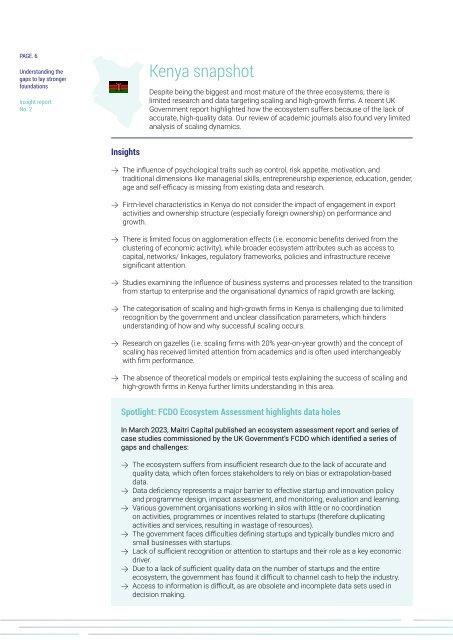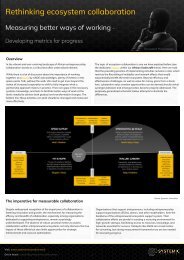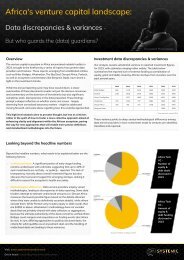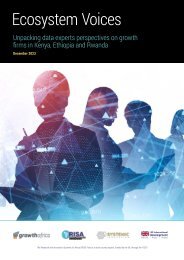Understanding the gaps to lay stronger foundations.
Appraising scaling data indicators in Kenya, Ethiopia and Rwanda. In this report, we highlight key elements of a data supply audit undertaken to determine what data exists that is relevant to scaling ventures in Kenya, Ethiopia and Rwanda. The findings inform the co-design and co-development of country-level data collaboratives to support ventures and ecosystem stakeholders by identifying, collating and diffusing relevant data and insights on scaling in the three countries.
Appraising scaling data indicators in Kenya, Ethiopia and Rwanda. In this report, we highlight key elements of a data supply audit undertaken to determine what data exists that is relevant to scaling ventures in Kenya, Ethiopia and Rwanda. The findings inform the co-design and co-development of country-level data collaboratives to support ventures and ecosystem stakeholders by identifying, collating and diffusing relevant data and insights on scaling in the three countries.
You also want an ePaper? Increase the reach of your titles
YUMPU automatically turns print PDFs into web optimized ePapers that Google loves.
PAGE. 6<br />
<strong>Understanding</strong> <strong>the</strong><br />
<strong>gaps</strong> <strong>to</strong> <strong>lay</strong> <strong>stronger</strong><br />
<strong>foundations</strong><br />
Insight report<br />
No. 2<br />
Kenya snapshot<br />
Despite being <strong>the</strong> biggest and most mature of <strong>the</strong> three ecosystems, <strong>the</strong>re is<br />
limited research and data targeting scaling and high-growth firms. A recent UK<br />
Government report highlighted how <strong>the</strong> ecosystem suffers because of <strong>the</strong> lack of<br />
accurate, high-quality data. Our review of academic journals also found very limited<br />
analysis of scaling dynamics.<br />
Insights<br />
→ The influence of psychological traits such as control, risk appetite, motivation, and<br />
traditional dimensions like managerial skills, entrepreneurship experience, education, gender,<br />
age and self-efficacy is missing from existing data and research.<br />
→ Firm-level characteristics in Kenya do not consider <strong>the</strong> impact of engagement in export<br />
activities and ownership structure (especially foreign ownership) on performance and<br />
growth.<br />
→ There is limited focus on agglomeration effects (i.e. economic benefits derived from <strong>the</strong><br />
clustering of economic activity), while broader ecosystem attributes such as access <strong>to</strong><br />
capital, networks/ linkages, regula<strong>to</strong>ry frameworks, policies and infrastructure receive<br />
significant attention.<br />
→ Studies examining <strong>the</strong> influence of business systems and processes related <strong>to</strong> <strong>the</strong> transition<br />
from startup <strong>to</strong> enterprise and <strong>the</strong> organisational dynamics of rapid growth are lacking.<br />
→ The categorisation of scaling and high-growth firms in Kenya is challenging due <strong>to</strong> limited<br />
recognition by <strong>the</strong> government and unclear classification parameters, which hinders<br />
understanding of how and why successful scaling occurs.<br />
→ Research on gazelles (i.e. scaling firms with 20% year-on-year growth) and <strong>the</strong> concept of<br />
scaling has received limited attention from academics and is often used interchangeably<br />
with firm performance.<br />
→ The absence of <strong>the</strong>oretical models or empirical tests explaining <strong>the</strong> success of scaling and<br />
high-growth firms in Kenya fur<strong>the</strong>r limits understanding in this area.<br />
Spotlight: FCDO Ecosystem Assessment highlights data holes<br />
In March 2023, Maitri Capital published an ecosystem assessment report and series of<br />
case studies commissioned by <strong>the</strong> UK Government’s FCDO which identified a series of<br />
<strong>gaps</strong> and challenges:<br />
→ The ecosystem suffers from insufficient research due <strong>to</strong> <strong>the</strong> lack of accurate and<br />
quality data, which often forces stakeholders <strong>to</strong> rely on bias or extrapolation-based<br />
data.<br />
→ Data deficiency represents a major barrier <strong>to</strong> effective startup and innovation policy<br />
and programme design, impact assessment, and moni<strong>to</strong>ring, evaluation and learning.<br />
→ Various government organisations working in silos with little or no coordination<br />
on activities, programmes or incentives related <strong>to</strong> startups (<strong>the</strong>refore duplicating<br />
activities and services, resulting in wastage of resources).<br />
→ The government faces difficulties defining startups and typically bundles micro and<br />
small businesses with startups.<br />
→ Lack of sufficient recognition or attention <strong>to</strong> startups and <strong>the</strong>ir role as a key economic<br />
driver.<br />
→ Due <strong>to</strong> a lack of sufficient quality data on <strong>the</strong> number of startups and <strong>the</strong> entire<br />
ecosystem, <strong>the</strong> government has found it difficult <strong>to</strong> channel cash <strong>to</strong> help <strong>the</strong> industry.<br />
→ Access <strong>to</strong> information is difficult, as are obsolete and incomplete data sets used in<br />
decision making.








